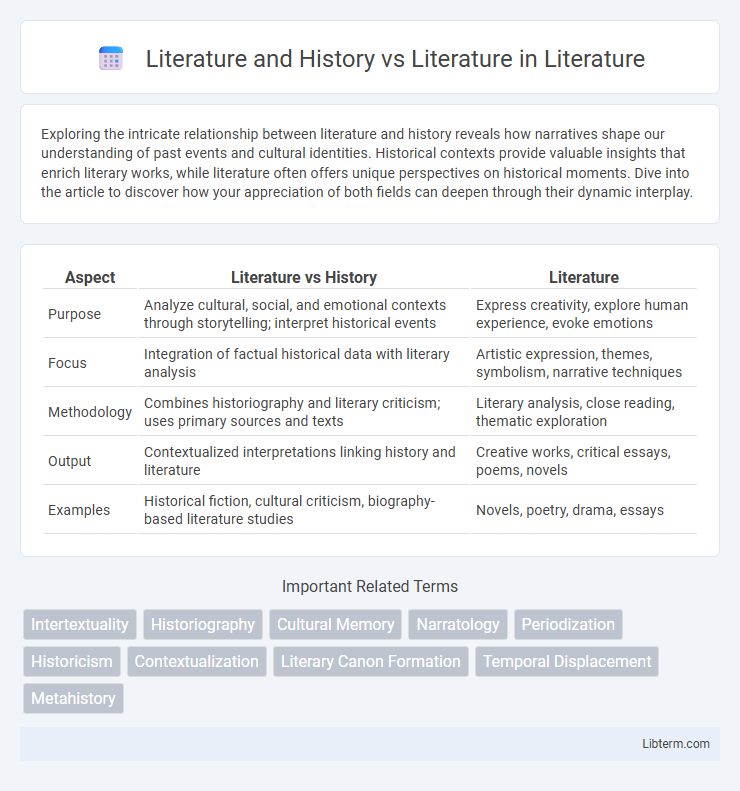Exploring the intricate relationship between literature and history reveals how narratives shape our understanding of past events and cultural identities. Historical contexts provide valuable insights that enrich literary works, while literature often offers unique perspectives on historical moments. Dive into the article to discover how your appreciation of both fields can deepen through their dynamic interplay.
Table of Comparison
| Aspect | Literature vs History | Literature |
|---|---|---|
| Purpose | Analyze cultural, social, and emotional contexts through storytelling; interpret historical events | Express creativity, explore human experience, evoke emotions |
| Focus | Integration of factual historical data with literary analysis | Artistic expression, themes, symbolism, narrative techniques |
| Methodology | Combines historiography and literary criticism; uses primary sources and texts | Literary analysis, close reading, thematic exploration |
| Output | Contextualized interpretations linking history and literature | Creative works, critical essays, poems, novels |
| Examples | Historical fiction, cultural criticism, biography-based literature studies | Novels, poetry, drama, essays |
Defining Literature: Scope and Significance
Literature encompasses a wide range of written and oral texts that reflect human experiences, emotions, and ideas, serving as a vital cultural artifact beyond mere historical documentation. While history focuses on chronologically recording events and facts, literature interprets and expresses deeper meanings, often revealing societal values and personal perspectives. Understanding the scope of literature highlights its significance in shaping cultural identity and enriching historical knowledge through narrative and artistic expression.
The Evolution of Literature Through Time
Literature and History intersect by revealing how cultural narratives and societal values have transformed across eras, reflecting shifting ideologies and human experiences. Historical context enriches literary analysis by providing insights into the motivations and circumstances surrounding works, highlighting trends from oral traditions to modern digital storytelling. This evolution showcases literature's role as a dynamic mirror of historical change, preserving collective memory while influencing future cultural developments.
Literature and History: Interwoven Narratives
Literature and history are inextricably linked, as literary works often reflect and interpret historical events, cultures, and societal changes, providing deeper insight into the human experience across time. Historical narratives influence literary themes, character development, and plot structures, enabling readers to explore the complexities of past eras through storytelling. This interwoven relationship enriches both disciplines, offering multidimensional perspectives that enhance understanding of historical contexts and literary expression.
Distinguishing Literature from Historical Accounts
Literature encompasses imaginative and artistic expressions, often prioritizing narrative creativity and thematic depth, while historical accounts focus on factual accuracy and chronological events. Distinguishing literature from history involves analyzing the intent behind texts: literature aims to evoke emotions and explore human experience, whereas historical writing seeks to document and interpret past realities based on evidence. Understanding these differences is crucial for critical reading and evaluating sources in academic and cultural contexts.
Literary Devices vs Historical Facts
Literature extensively employs literary devices such as symbolism, metaphor, and narrative perspective to convey deeper meanings and evoke emotional responses. In contrast, historical texts emphasize accurate representation of historical facts, relying on dates, events, and verified sources to document past realities. While literary works prioritize artistic expression and thematic exploration, history focuses on factual accuracy and chronological documentation.
The Role of Context in Literature and History
The role of context in literature and history is crucial for understanding the meanings and significance embedded in texts and events. Literature relies on cultural, social, and historical background to interpret themes, character motivations, and symbols, while history emphasizes chronological and factual context to reconstruct past realities accurately. Analyzing literary works alongside historical contexts enriches comprehension by revealing the interplay between artistic expression and the socio-political conditions of specific time periods.
Impact of History on Literary Movements
Historical events profoundly shape literary movements by influencing themes, styles, and narratives that reflect societal changes and collective experiences. For instance, the Romantic movement emerged as a reaction to the Industrial Revolution and political upheavals, emphasizing emotion and nature over Enlightenment rationality. Similarly, Modernist literature mirrors the disillusionment and fragmentation following World War I, demonstrating history's critical role in defining literary evolution.
Literature as a Reflection of Historical Events
Literature serves as a powerful reflection of historical events, capturing the social, cultural, and political contexts of specific time periods through narrative, character development, and thematic exploration. By analyzing literary works, scholars gain valuable insights into the collective consciousness, prevailing ideologies, and lived experiences of historical eras, effectively bridging the gap between past realities and contemporary understanding. This symbiotic relationship enables literature to function as both an artistic expression and a vital historical document.
Comparative Analysis: Literature vs History
Comparative analysis of Literature and History reveals distinct methodologies: literature employs narrative imagination and thematic exploration to evoke human experience, while history relies on empirical evidence and chronological reconstruction to understand past events. Literature often interprets subjective truths and cultural values through symbolism and metaphor, whereas history prioritizes objective analysis and factual accuracy based on primary sources and archival research. This contrast highlights how literature enriches emotional and philosophical insight, whereas history provides context and causality in the study of human societies.
The Enduring Value of Studying Literature Separately
Studying literature separately preserves its unique ability to explore human experience, emotions, and creativity beyond historical facts and contexts. Literature offers timeless themes and artistic expressions that transcend specific historical periods, enabling deeper empathy and critical thinking. This independent focus enhances skills in textual analysis and interpretation, crucial for appreciating diverse cultural narratives and ethical dilemmas.
Literature and History Infographic

 libterm.com
libterm.com